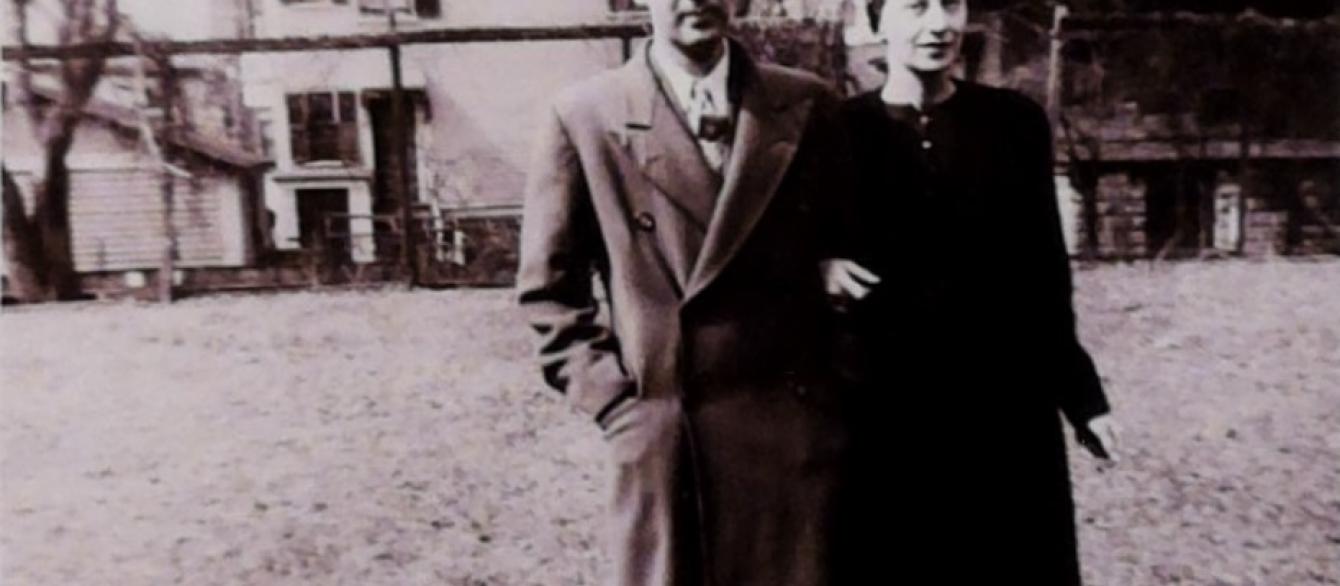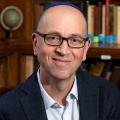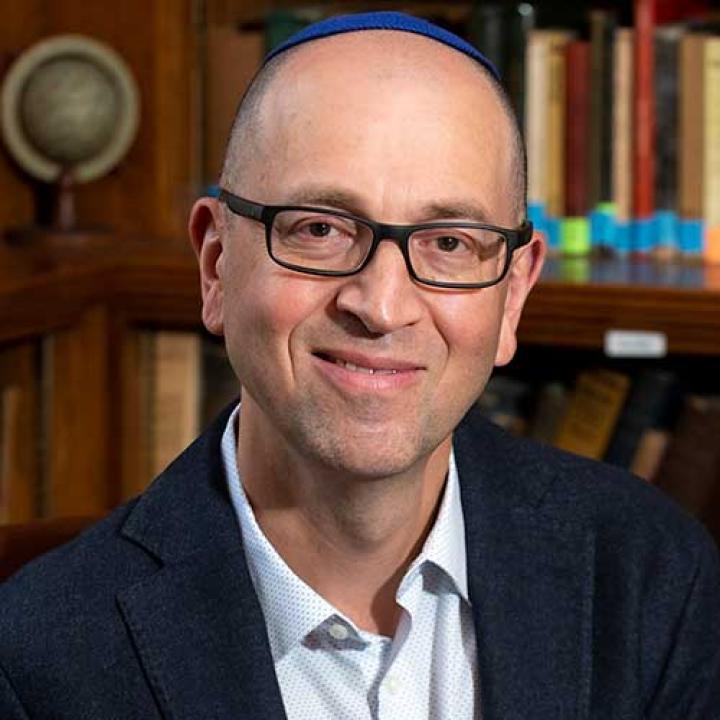What places come to mind when you think of Vladimir Nabokov in America? Cornell University maybe, where he taught for more than a decade. Or the American West, depicted with such a keen eye in Lolita. Yet many of the great writer’s American firsts occurred during his formative immigrant years in the Boston area, from 1941 to 1948. Here he became an American poet, critic, novelist, and translator, an American college professor, an American entomologist. Here he and his family, stateless refugees, were naturalized as American citizens. We still have much to learn about Nabokov’s time in and around Boston, but the recently published Nabokov on the Heights: New Studies From Boston College, which I had the honor of editing and from which this essay is partially adapted, offers insights for those interested in the writer’s work and biography, and in Greater Boston’s cultural history.
Nabokov’s connections to Boston predate his arrival with his family to the U.S. from France in 1940, just weeks before the fall of Paris to Nazi troops. In the early 1930s, while still living in Berlin, Nabokov started collaborating with a Boston-area Russian émigré, Peter A. Pertzoff, who co-translated the short stories that would establish Nabokov’s literary reputation in 1940s America. When Nabokov set sail to New York from Saint-Nazaire on 19 May 1940, the acquaintance he had listed in the manifest of the S.S. Champlain under “Whether going to join a relative or friend” was “Serge Koussevitzky, 88 Druce Str. Brookline, Mass.” A Jewish-Russian immigrant, Koussevitzky served as conductor of the Boston Symphony Orchestra in 1924-1949—his name still familiar to patrons of the BSO’s famed Tanglewood summer concerts.
As timelined by Nabokov’s biographer Brian Boyd, Vladimir, his wife Véra (née Slonim), and their son, Dmitri, lived in the Boston area, in Cambridge and Wellesley, from September 1941 to June 1948. In all, Nabokov resided at three addresses in Wellesley and five in Cambridge, including a two-week stay, in the spring of 1953, at the house that belonged to Robert Frost. Of Nabokov’s almost seven years as a Bostonian and a New Englander, for six he lived at the same address, 8 Craigie Circle, in Cambridge—a short stroll to Cambridge Common. On Sundays, young Dmitri, the future opera basso, car racer, and literary translator, would walk to nearby Christ Church, an Episcopalian church where he sang Handel’s “Messiah.” As I discovered in my research, Dmitri Nabokov also trained his voice on Ernest Bloch’s Jewish liturgical music at a Reform synagogue located across the river in Brookline.
“An elephant is a very great animal, but does this mean we should make him professor of zoology?”
After moving to Ithaca, where Nabokov assumed his professorship at Cornell in 1948, he and Véra returned to the Boston area for short visits and three extensive stays, first in the spring of 1952, to lecture at Harvard, and later on two sabbaticals, in the spring of 1953 and 1956. In the 1950s Dmitri attended Harvard College and studied voice at the Longy School of Music. In 1957, not long before the Lolita explosion and the start of Nabokov’s world fame and acclaim, a discussion of bringing him to Harvard on a permanent basis hit a dead end after Roman Jakobson’s strenuous objection. I heard the account from my late Boston College colleague Lawrence G. Jones, who had studied under Jakobson at Columbia and Harvard and collaborated with him on a short book about Shakespeare’s verbal art. Objecting to the idea of hiring Nabokov because he was a prominent writer, Jakobson intoned, English consonants palatalized nearly beyond recognition: “An elephant is a very great animal, but does this mean we should make him professor of zoology?”
It would take a book to detail all of Nabokov’s Boston-centered discoveries (and disappointments), so I will only highlight a few.
Nabokov came to the Boston area in March 1941 for two weeks of lectures at Wellesley College. It was during the first visit to Boston that he met with Edward A. Weeks, editor of The Atlantic Monthly, where the “Englished,” as Nabokov called them, versions of his great stories “Cloud, Castle, Lake” and “The Aurelian” appeared in 1941. That fall, Nabokov first visited the butterfly collection at Harvard’s Museum of Comparative Zoology, which would become his lepidoptera research station. At Wellesley he would serve, with interruptions, until his departure for Cornell, as a “Resident Lecturer in Comparative Literature” and an instructor of Russian subjects. He tasted of U.S. academic politics when this premier women’s college did not rehire him for the academic year 1942-1943, in large measure owing to Nabokov’s principled anti-Soviet views that he refused to dial down even as the United States and the USSR were allies fighting Nazi Germany.
While living in the Boston area, Nabokov wrote his first English-language short story, “The Assistant Producer” (1943), and conceived of and carried out his first American novel, the dystopian Bend Sinister. To quote from Nabokov’s introduction,
The greater part of the book was composed in the winter and spring of 1945-1946, at a particularly cloudless and vigorous period of life. My daily consumption of cigarettes had reached the four-package mark. I slept at least four or five hours, the rest of the night walking pencil in hand about the dingy little flat in Craigie Circle, Cambridge, Massachusetts, where I lodged under an old lady with feet of stone and above a young woman with hypersensitive hearing. Every day including Sundays, I would spend up to 10 hours studying the structure of certain butterflies in the laboratorial paradise of the Harvard Museum of Comparative Zoology; but three times a week I stayed there only till noon and then tore myself away from microscope and camera lucida to travel to Wellesley (by tram and bus, or subway and railway), where I taught college girls Russian grammar and literature.
During the Boston years, Nabokov produced exemplary metrical translations of some of his favorite Russian poets from the classical age, Alexander Pushkin, Mikhail Lermontov, Afanasy Fet, and Fyodor Tyutchev, as well as translations of his older émigré contemporary Vladislav Khodasevich, who had died in Paris less than three months before the outbreak of World War 2. While a Russian expatriate and a new Bostonian, Nabokov felt the first pangs of what would become his iconoclastic Eugene Onegin translation. Even more importantly, in 1941-1942 Nabokov composed his first English-language poems. With his verses written in English, Nabokov debuted in The New Yorker, which became the main American port of call for his poetry, short fiction, and excerpts from memoirs and novels. And as a Wellesley instructor, Nabokov created his only book of English-language literary biography and criticism, Nikolai Gogol, which James Laughlin’s New Directions put out in 1944.
Nabokov’s first postwar letter to his sister communicates a Russian immigrant’s gratitude to America for having given shelter to him and his Jewish wife and son during the Shoah.
During his early American—Boston—years, Nabokov also developed important connections with American authors and intellectuals, among them the writer Sylvia Berkman (at Wellesley) and the literary scholar Harry Levin (at Harvard). While living in Cambridge and teaching at Wellesley, twice a week Nabokov would commute by a combination of different transports. On 21 January 1946, Nabokov described the journey in a Russian-language letter to his beloved younger sister Elena (Hélène) Sikorski, who was then living in Prague:
Not far from Craigie Circle I board a bus, then in the city center I switch to the underground [this is the Red Line of the T], which takes me to the center of Boston, to the train station. This takes forty minutes. At the train station I get on a real train and an hour later arrive at Wellesley. There I take a taxi cab, which delivers me to the luxurious campus (the college site), somewhat resembling English universities.
We still do not know enough about Nabokov’s encounter with Greater Boston, urban and suburban, and its many immigrant communities and institutions. Parts of the area would serve as an inspiration and setting of Nabokov’s literary works, notably Cambridge’s fancier apartment blocks in “Double Speak” (1945, retitled “Conversation Piece, 1945”) and the Wellesley campus in “The Vane Sisters” (1951). Along with details of his first American years, Nabokov’s first postwar letter to his sister Elena, mailed from Cambridge on 25 October 1945, communicates a Russian immigrant’s gratitude to America for having given shelter to him and his Jewish wife and son during the Shoah: “I love this country. Along with descents into wild poshlost’, there are peaks here, on which one can have picknicks with ‘understanding’ friends.’” As in many of Nabokov’s letters from the 1940s, notes of admiration or appreciation mask or hide festering wounds of American society that tore at Nabokov’s heart—philistinism, consumerism, but above all else, racism and antisemitism. As far as the latter is concerned, Nabokov had his fill of genteel upper-class antisemitism at parlors and cocktail receptions, and of the unabashed “Hebrews not accommodated” type of anti-Jewish prejudice during the trips he and his family took north of Boston to N’iu Gempshir and to nearby Cape Cod. At the Cape, Nabokov visited his principal American interlocutor Edmund Wilson in Wellfleet, for Thanksgiving in 1941 and two more times, in 1943 and 1944.
Vladimir Nabokov still lives in the Boston area—in the many literary memories he left for posterity, in writing projects and trips both realized and unrealized, in retellings of his real and imagined adventures and misadventures, and in the memory of his former students and their offspring. Once in the 2000s, I was receiving Versed (what a name for a sedative to be given to a student of poetry!) before a medical procedure at a Wellesley medical clinic. Upon hearing that I taught literature at Boston College, the anesthesiologist asked me if I ever lectured on Nahbokov (pronounced with a formidable Boston accent). The anesthesiologist proceeded to tell me that his mother had studied with Nabokov, whereupon I drifted into sleep. Subsequently I checked and confirmed that Katherine Reese Peebles had indeed been Nabokov’s student at Wellesley. In 1943 she wrote a poignant profile of her professor for a college publication: “Fortyish, tall and thin, shoulders hunched forward, he resembles the romantic, American conception of a real artist. His face is like one of those which are often ascribed to geniuses and mad scientists in mystery novels.” To Stacy Schiff, who interviewed Peebles in the process of researching Véra Nabokov’s biography, Nabokov’s former student conjured up a memory of an un(der)consummated campus romance: “I took a course in Russian, and I got sidetracked on a course on Vladimir Nabokov. … He did like young girls. Just not little girls.”
Nabokov has a way of becoming mythologically immortal in the minds of his students and readers.

Vladimir and Véra Nabokov, Wellesley, 1944





![Vladimir Nabokov at Harvard’s Museum of Comparative Zoology, circa 1945-46. Courtesy of the Berg Collection of American Literature, New York Public Library. ]](/sites/default/files/styles/interior_hero_image_small/public/2025-10/Untitled-1.png?itok=SX0H5AKu)
